“Background: With increasing utilization of cannabis in the United States (US), clinicians may encounter more cases of Gastroparesis (GP) in coming years.
Objective: The primary outcome was inpatient mortality for GP with cannabis use. Secondary outcomes included system-based complications and the burden of the disease on the US healthcare system.
Methods: From the Nationwide Inpatient Sample (NIS), we identified adult hospitalizations with a primary discharge diagnosis of GP for 2016 and 2017. Individuals ≤18 years of age were excluded. The study population was subdivided based on a secondary diagnosis of cannabis use. The outcomes included biodemographic characteristics, mortality, complications, and burden of disease on the US healthcare system.
Results: For 2016 and 2017, we identified 99,695 hospitalizations with GP. Of these hospitalizations, 8,870 had a secondary diagnosis of cannabis use while 90,825 served as controls. The prevalence of GP with cannabis use was 8.9%. For GP with cannabis use, the patients were younger (38.5 vs 48.1 years, p < 0.001) with a Black predominance (Table 1) and lower proportion of females (52.3 vs 68.3%, p < 0.001) compared to the non-cannabis use cohort. Additionally, the cannabis use cohort had higher percentage of patients with co-morbidities like hypertension, diabetes mellitus and a history of smoking. The inpatient mortality for GP with cannabis use was noted to be 0.27%. Furthermore, we noted shorter mean length of stay (LOS) (3.4 vs 4.4 days, aMD: -0.7, 95%CI: -0.9 – [-0.5], p < 0.001), lower mean total hospital charge (THC) ($30,400 vs $38,100, aMD: -5100, 95%CI: -6900 – [-3200], p < 0.001), and lower rates of sepsis (0.11 vs 0.60%, aOR: 0.22, 95% CI: 0.05-0.91, p = 0.036) for GP hospitalizations with cannabis use compared to the non-cannabis use cohort.
Conclusion: Inpatient mortality for GP hospitalizations with cannabis use was 0.27%. Additionally, these patients had shorter LOS, lower THC, and lower sepsis rates.”
https://pubmed.ncbi.nlm.nih.gov/34096455/
https://www.tandfonline.com/doi/abs/10.1080/00325481.2021.1940219?journalCode=ipgm20





 “The Endocannabinoid System (ECS) is primarily responsible for maintaining homeostasis, a balance in internal environment (temperature, mood, and immune system) and energy input and output in living, biological systems.
“The Endocannabinoid System (ECS) is primarily responsible for maintaining homeostasis, a balance in internal environment (temperature, mood, and immune system) and energy input and output in living, biological systems. 

 “Cannabis has been used for its medicinal purposes since ancient times. Its consumption leads to the activation of Cannabis receptors CB1 and CB2 that, through specific mechanisms can lead to modulation and progression of inflammation or repair. The novel findings are linked to the medical use of Cannabis in gastrointestinal (GI) system.
“Cannabis has been used for its medicinal purposes since ancient times. Its consumption leads to the activation of Cannabis receptors CB1 and CB2 that, through specific mechanisms can lead to modulation and progression of inflammation or repair. The novel findings are linked to the medical use of Cannabis in gastrointestinal (GI) system. “The cannabis plant has been widely researched for many therapeutic indications and found to be effective in many chronic conditions such as epilepsy, neuropathic or chronic pain and more. However, biased opinion against compounds of the plant, regulatory as well as compounding challenges have led to very few approved medicinal products. Those formulations which are approved are dosed several times a day, creating an unmet need for controlled release (CR) formulations of
“The cannabis plant has been widely researched for many therapeutic indications and found to be effective in many chronic conditions such as epilepsy, neuropathic or chronic pain and more. However, biased opinion against compounds of the plant, regulatory as well as compounding challenges have led to very few approved medicinal products. Those formulations which are approved are dosed several times a day, creating an unmet need for controlled release (CR) formulations of 